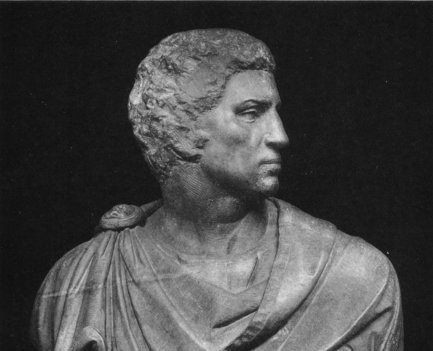Most people know the story of the assassination of Julius Caesar on the 15 March 44 B.C.E. Shakespeare made the event famous in his play Julius Caesar, and has left many saying “Beware the ides of March.”1 However, the assassination of Caesar may never have happened if Marcus Brutus had not agreed with Cassius. To understand the complete story of the assassination of Caesar, one has to understand the role that Marcus Brutus played.
Marcus Junius Brutus the Younger, better known as Brutus, is descended from Lucius Junius Brutus, founder and first consul of the Roman Republic in 509 B.C.E. The political future of Rome was so important to Lucius that he ordered his oldest two sons put to death for their desire to restore Rome to a monarchy. Lucius spared the life of his youngest son and it is through him that Marcus was born.2 Brutus’ own father, Marcus Brutus, was killed by Pompey the Great during a revolt.3
So who was this Brutus? He was a typical Roman, who received the traditional education of the Roman elite and was greatly influenced by the writings of Plato. Upon completion of his education, Brutus was given a position in the government.4 In both his marriage and in his public life, Brutus was expected to align with Caesar, but instead, he made his peace with Pompey the Great, eventually siding with him during the Roman Civil War in 49-48 B.C.E.5
Brutus was captured at the Battle of Pharsalus and spared by Caesar, causing Brutus to switch sides to Caesar.6 It is important to note at this time that Caesar had a special fondness for Brutus, believing Brutus was his son, born out of a love affair Caesar had with Servilia, Brutus’ mother. Out of this fondness, Caesar had instructed his commanders not to harm Brutus should he be captured in battle.7 Caesar pardoned Brutus for his role during the Civil War and gave him a high ranking government job. Brutus in turn convinced Caesar to give a government position to Cassius, Brutus’ brother-in-law.8
It was during this time following the Civil War that Caesar declared himself dictator of Rome, as allowed by the constitution during times of emergency, but not to last more than six months. Caesar wore the robe, crown, and scepter of the general, and called himself imperator. As leader of Rome, he had complete control over the armies. Many senators felt their power being threatened and feared that Caesar would soon appoint himself King of Rome.9
Cassius did not like Caesar, and soon began to plot to end his reign of power. He attempted to recruit his friends and fellow senators, but they refused to go along with Cassius unless he could convince Brutus to join them.10 Brutus had such an honorable reputation that his participation was crucial to the success of the cause. Brutus agreed to participate because of his family history in creating and protecting the Republic at its founding and the ensuing Roman tradition of opposing all forms of tyranny. Both Brutus and Cassius believed that once Caesar was dead, Rome would naturally return to the traditional Republic.11
The group of conspirators had heard that Caesar would be attending a senate meeting on March 15, and they planned the assassination for that day. They knew that it would not look suspicious, since they all had to attend the meeting of the senate and they believed that the Ides of March was a blessed day to make their move, since it was a religious holiday in Rome. Ironically, there was a statue of Pompey the Great, the leader Caesar had killed after the Civil War ended, in the portico where the assassination was to take place as soon as Caesar arrived. The conspirators believed it to be the perfect date and place to make their attempt to restore the Republic.12

However, on the planned day, Caesar was late and the conspirators became worried. When Caesar finally arrived, the senators surrounded him as he took his seat, and the attack began. All the senators attacked at once, creating a frenzy in which many of the them were stabbed in the process; even Brutus was stabbed in the hand. When that attack was over, Caesar was dead.13 The next day, Antonius (also known as Mark Antony), the sole remaining consul, granted all the conspirators amnesty, and distributed provinces to them as rewards. Brutus was given the province of Crete and moved there with his family where he continued to work for the government.14

Meanwhile, Octavian, Caesar’s nephew and heir, was brought to the capital to take Caesar’s place as leader of Rome. Octavian was angry that Antonius had pardoned the conspirators and when the common people of Rome learned of the assassination of Caesar, they too were angry that none of the conspirators had been punished. This rift between the people and the leaders began to cause a rift between Octavian and Antonius. Soon the leaders of Rome began to align themselves between Octavian and Antonius, and another war civil war began. Known as the Post-Caesarian Civil War, this war was between Octavian and his supporters and Antonius and his supporters in order to end the rift that had been growing. It did not take long for Antonius to be defeated by Octavian, resulting in a truce that joined their armies together. This is also when the Second Triumvirate was formed in 43 B.C.E. between Octavian, Antonius, and Marcus Lepidus allowing the three of them to rule Rome together.15
The next civil war in Rome, known as the Liberators’ Civil War, was fought between the Second Triumvirate and the liberators (those who assassinated Caesar and their supporters). Brutus and Cassius were the main targets of the Roman army and separately rallied troops to fight with them. Brutus, according to Plutarch, “was esteemed by the many for his virtues, but loved by his friends, admired by the nobles, and not hated even by his enemies.”16 Because of this, many people in Rome had faith in his motives and believed that while the other senators had murdered Caesar out of hatred and spite for his power, Brutus had participated because he truly wanted to end the tyranny that he believed Caesar had created in Roman government.17 Unable to defeat Octavian’s army, Cassius, fearing being captured, committed suicide.18
Unfortunately for Brutus, his army was not able to defeat the Roman army either, and he admitted defeat at the Battle of Philippi in 42 B.C.E. Also fearing being captured, Brutus fled to the hills with a good friend and fellow soldier. It was there that Brutus convinced his friend to take his sword and hold it upright, Brutus then fell upon his sword, killing himself. Antonius still held much respect for Brutus and had his body wrapped up in the finest purple cloth for the cremation. After he was cremated, his ashes were sent to his mother, since his wife was already dead, another suicide.19
Even after his death, Brutus served as a role model for senators and his story reminded emperors that they served at their own peril if they ignored the senate.20 Brutus did not end tyranny or civil war, with many battles leading to the loss of the Roman Republic. According to Shakespeare, Brutus acted out of honor to protect his home from a tyrant. Dante placed Brutus in the worst level of Hell in the mouth of Satan next to Judas Iscariot.21 Either way one remembers Brutus, one must remember the conspiracy would never have gotten anywhere without the participation of Brutus.
- William Shakespeare, Julius Caesar (Boston: Ginn and Company, 1908), Kindle edition, Act 1 scene 2. ↵
- Salem Press Biographical Encyclopedia, January 2017, s.v. “Marcus Junius Brutus,” by Michael Witsoki. ↵
- Salem Press Encyclopedia, January 2016, s.v. “Brutus,” by Richard Westall. ↵
- Salem Press Biographical Encyclopedia, January 2017, s.v. “Marcus Junius Brutus,” by Michael Witsoki. ↵
- Salem Press Encyclopedia, January 2016, s.v. “Brutus,” by Richard Westall. ↵
- Salem Press Encyclopedia, January 2016, s.v. “Brutus,” by Richard Westall. ↵
- Plutarch, Plutarch’s Lives Volume IV (London: George Bell & Sons, 1892), 402, Project Gutenberg, https://www.gutenberg.org/files/44315/44315-h/44315-h.htm#Page_398 (accessed October 23, 2017). ↵
- Plutarch, Plutarch’s Lives Volume IV (London: George Bell & Sons, 1892), 404-405, Project Gutenberg, https://www.gutenberg.org/files/44315/44315-h/44315-h.htm#Page_398 (accessed October 23, 2017). ↵
- Funk & Wagnalls New World Encyclopedia, 2016, s.v. “Caesar, Gaius Julius.” ↵
- Plutarch, Plutarch’s Lives Volume IV (London: George Bell & Sons, 1892), 407-408, Project Gutenberg, https://www.gutenberg.org/files/44315/44315-h/44315-h.htm#Page_398 (accessed October 23, 2017). ↵
- Salem Press Biographical Encyclopedia, January 2017, s.v. “Marcus Junius Brutus,” by Michael Witsoki ↵
- Plutarch, Plutarch’s Lives Volume IV (London: George Bell & Sons, 1892), 410-412, Project Gutenberg, https://www.gutenberg.org/files/44315/44315-h/44315-h.htm#Page_398 (accessed October 23, 2017). ↵
- Plutarch, Plutarch’s Lives Volume IV (London: George Bell & Sons, 1892), 413, Project Gutenberg, https://www.gutenberg.org/files/44315/44315-h/44315-h.htm#Page_398 (accessed October 23, 2017). ↵
- Plutarch, Plutarch’s Lives Volume IV (London: George Bell & Sons, 1892), 416, Project Gutenberg, https://www.gutenberg.org/files/44315/44315-h/44315-h.htm#Page_398 (accessed October 23, 2017). ↵
- Plutarch, Plutarch’s Lives Volume IV (London: George Bell & Sons, 1892), 418-419, Project Gutenberg, https://www.gutenberg.org/files/44315/44315-h/44315-h.htm#Page_398 (accessed October 23, 2017). ↵
- Plutarch, Plutarch’s Lives Volume IV (London: George Bell & Sons, 1892), 425, Project Gutenberg, https://www.gutenberg.org/files/44315/44315-h/44315-h.htm#Page_398 (accessed October 23, 2017). ↵
- Plutarch, Plutarch’s Lives Volume IV (London: George Bell & Sons, 1892), 425, Project Gutenberg, https://www.gutenberg.org/files/44315/44315-h/44315-h.htm#Page_398 (accessed October 23, 2017). ↵
- Plutarch, Plutarch’s Lives Volume IV (London: George Bell & Sons, 1892), 443-446, Project Gutenberg, https://www.gutenberg.org/files/44315/44315-h/44315-h.htm#Page_398 (accessed October 23, 2017). ↵
- Plutarch, Plutarch’s Lives Volume IV (London: George Bell & Sons, 1892), 449-453, Project Gutenberg, https://www.gutenberg.org/files/44315/44315-h/44315-h.htm#Page_398 (accessed October 23, 2017). ↵
- Salem Press Encyclopedia, January 2016, s.v. “Brutus,” by Richard Westall. ↵
- Kim Zarins, “‘Et tu, Brute?'” Calliope 17, no. 4 (December 2006): 42-44. ↵



83 comments
Roberto Rodriguez
I always had trouble with ancient roman history, there are just so many names that it is just confusing (at least for me). But this article was really well written and I did not have any major trouble following the story. The story of the assassination of Caesar always kind of confused me, but after reading about how Caesar had complete power I can understand. I think that anybody would agree that that much power for anyone is not right or fair.
Juan Arceo
This article helped depict the truth behind the assassination of the Julius Caesar and how Brutus planned this unfortunate yet ingenious plan. It was interesting to me that Caesar actually viewed Brutus as his own son, and then Brutus completely thought differently and basically said that killing him was the better option if it meant that the Republic could be restored.
Nicole Ortiz
This was a really well written article. It does a really great job at explaining what actually led up to the assassination of Julius Caesar rather just what is just usually told. Its interesting to see both sides of the story and to truly understand why he was killed. It made me sad though about how Julius had taken in Brutus and cared for him like as if he was his son and then ended up betraying him after being convinced by his brother in law. But it was done for a good reason and Brutus had good intentions behind his motives that many people didn’t understand.
Charli Delmonico
This article was very informative and well-written. I thought it was sweet that Caesar had wanted to spare Brutus of any harm upon capture, which made it harder to accept the fact that Brutus still allowed Caesar to be murdered, however I understand his reasoning. He simply wanted to protect Rome from becoming a tyranny, and Caesar was going down that path. There were also may suicides in this story which adds to to the depressing aspects of it.
Kenneth Gilley
It is amazing how complex this story really is, given its reputation as simple and straightforward. Brutus had so much influence in the Senate that no action would have be taken without his decision to join the conspiracy against Caesar. It seems that he agreed to help with the assassination because of his love for his country, not any kind of unjustified hatred for Caesar. This was a very interesting article!
Azucena Cuevas
I really enjoyed this article because it fills in the remaining gap for the assassination of Caesar. The article was really informative and interesting. I had no idea that Brutus was the reason the remaining senators decided to attack Caesar that day. It is understandable that they all feared Caesar becoming a tyrant and ruining the Roman empire but his assassination seemed to be a bit much. But I guess at the time they all believed it was the best option in their eyes. If Brutus wouldn’t have agreed the Roman Empire would have had a different history.
Vanessa Quetzeri
This is very informative; the assassination of Ceaser would never have happened if it wasn’t for Marcus Brutus. Whether we see him as a traitor or merely trying to keep a tyranny from continuing, it is crazy to think that one small action could lead to a domino effect. After Caesar’s death, there was so much warfare, leading to deaths and suicide.
Victoria Davis
I had just read a previous article about Julius Caesar and his assassination, so it was very beneficial in reading this article too. It gave me previous knowledge that was in detail about the events that led us to his death. I had heard of Marcus Brutus but I was able to read a lot more information about him and his contributions.
Margaret Maguire
I knew a little bit about Julius Caesar and how he was stabbed to death but I never know how this came to be and who planned it all out. This article was really cool to learn the ins and outs of the assassination. Marcus Brutus was the son of the founder and first consul of the Roman Republic. When Caesar was possibly planning to become king, Brutus was the first to be asked what should we do. The senators decided to stab Caesar all at once and Brutus got his hand stabbed in the process. This was a really interesting article.
Kimberly Parker
It’s nice to learn more about a story that everyone thought was just simple. The assassination of Julius Caesar was so much more complex than people would’ve thought. The assassination occurred due to a deep hatred for Caesar, but also because this man was doing what he believed was the right thing for his nation. There are many sides to this story, and that’s what people fail to see, the many sides.